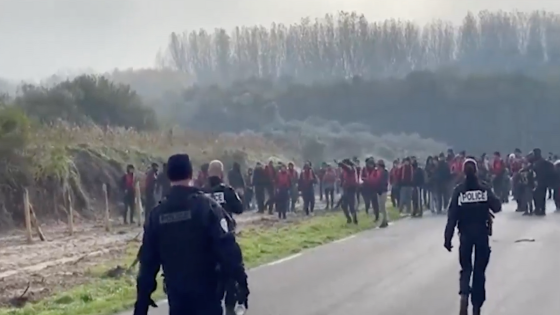Increasing numbers of Channel migrants are using young children as “human shields” to prevent police getting to their boats on French beaches, in what senior Border Force officials have told GB News is a highly worrying development.
French law enforcement officers are also facing a huge spike in levels of migrant violence, with police regularly threatened and attacked with weapons including machetes and even firearms.
At the weekend, a migrant was shot and seriously injured in violence between rival people smuggling gangs near Dunkirk.
The Kurdish migrant was shot in the chest at the Loon-Plage camp, after a rival group fired several shots from a rifle and what was reported to be a Kalashnikov automatic weapon.
GB News was given exclusive access to the Small Boats Operational Command at Dover harbour for a week which saw more than 900 migrants taken to the Kent port.
As GB News filmed, the Border Force vessel Defender entered Dover harbour with another 66 migrants onboard, some of the 7,167 who have arrived so far this year.
That figure is much higher than the 5,745 Channel migrants who crossed the English Channel at the same point last year.
The arrivals come as police in France are being subjected to rapidly growing levels of serious migrant violence, as they attempt to reach and puncture the boats.
Speaking exclusively to GB News in Dover, the Small Boats Operational Command’s Deputy Director of International Operations, Carol Heginbottom said the intensifying violence was a “massive concern”.
“We’re working very closely with the French and this is a massive concern for the UK and the French,” the Deputy Director said.
“The violence that is now shown to our French colleagues trying to prevent the launches, trying to save people from putting their lives at risk, is huge.
“We’ve seen them attacked with sticks, metal bars, machetes, using women and children that are there to cross, using them as human shields to prevent law enforcement taking action.
“It’s growing, it’s getting worse and we need to continue to keep plugging away at stopping these organised criminal gangs that are putting people at risk.”
Heginbottom said there was also great concern about an emerging tactic, where groups of migrants storm and fight other groups of migrants to force their way onto boats.
Last Tuesday, five migrants died off the French coast after a large group of African men fought with other migrants on the beach at Wimereux and pushed their way onto the vessel.
The dangerously overcrowded boat, carrying 112 migrants, got into trouble just a couple of hundred meters off the beach.
“The criminal gangs don’t always work together, they’re trying to maximise their own profits against others,” the senior officer said.
“You will always get opportunists who will try and get on and that’s when there’s real terror and chaos, because sometimes it can be dark in the middle of the night.
“We’ve seen children and women getting trampled on as they try to get on the boats.
“It’s become chaotic. It’s never been well managed. The organised criminal gangs don’t care about people’s welfare.”
GB News was shown the type of small boat the criminal gangs are now using to ferry migrants across the Channel.
Trevor Taylor, a Higher Officer in the Small Boats Operational Command said: “These aren’t seaworthy at all, because they’re just not made to any standard.”
Officer Taylor said criminal gangs were now squeezing an increasing number of people on the boats. 70 or 80 on a single boat is common, he said.
“These boats are just not safe. The way they’re constructed means that a cut or puncture on one part would see the whole thing go down.”
The migrants are often given cheap air and pumps to try to keep the vessels inflated, and makeshift plastic containers to bail out sea water.
There are few lifejackets onboard, and most are completely unsuitable for the task.
He showed GB News a child’s plastic inflatable ring, which he said were often used by adults and children as makeshift flotation aids.
The outboard motors used by the criminal gangs are also completely unsuitable for the task, according to another Border Force officer George Stevenson.
He said the motors were underpowered and prone to breaking down.
“You look at the engine, you might think, yeh that’s a proper engine you’d expect.
“However, the organised crime groups often put stickers on the engine cover suggesting it’s 30 horse power, when in reality it’s only about 10 or 15hp, completely unsuitable to go on these boats at sea.”
As GB News wrapped up filming, a Border Force support ship arrived at the Small Boats Operational Command centre with another batch of boats recovered from the Channel.
Prime Minister Rishi Sunak hopes the first of potentially thousands of small boat asylum seekers will be on flights to Rwanda by the middle of the Summer.
But in the months before then, as weather conditions improve, thousands more will likely make the illegal crossing in dangerously overcrowded and unseaworthy boats.
Source Agencies



